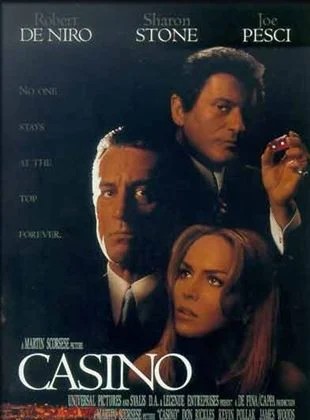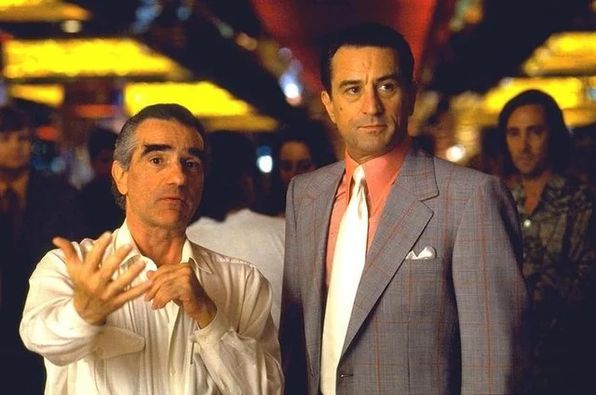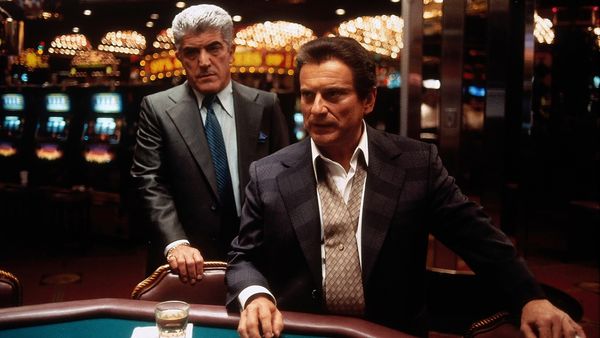Casino (1995)

Suggested videos for you:
Papillon: The Iron Will of a Thief
Subservience 2024 : Beyond Flesh: When Robots Become Indistinguishable from Humans
The Beekeeper 2 (2025 ): A Secret Agent’s Battle Against a Fraud Syndicate
“Casino”: A Gripping Exploration of Greed and Power Directed by Martin Scorsese

Released in 1995, “Casino” is a compelling crime drama directed by the legendary Martin Scorsese, known for his mastery in depicting the darker sides of human nature. Based on the non-fiction book “Casino: Love and Honor in Las Vegas” by Nicholas Pileggi, who co-wrote the screenplay with Scorsese, the film offers a gritty and unflinching look at the rise and fall of organized crime in Las Vegas during the 1970s and early 1980s. With its intricate storytelling, strong performances, and stunning visuals, “Casino” stands as a landmark film that delves deep into the themes of greed, power, and betrayal.

The narrative revolves around Sam “Ace” Rothstein (Robert De Niro), a skilled gambler and casino operator who is tasked with running the Tangiers Casino on behalf of the Chicago mob. Ace’s meticulous approach to managing the casino leads to unprecedented success, but as the casino thrives, so do the conflicts and tensions among the key players. The story is further complicated by Ace’s tumultuous relationship with his glamorous but troubled wife, Ginger McKenna (Sharon Stone), and his childhood friend and enforcer, Nicky Santoro (Joe Pesci). As Ace grapples with the pressures of running the casino and maintaining control over his personal life, the film explores the intricate dynamics of loyalty and betrayal within the criminal world.

Martin Scorsese’s direction is marked by his signature style, utilizing dynamic cinematography and an evocative soundtrack to enhance the film’s atmosphere. The cinematography, crafted by Robert Richardson, captures the opulence of Las Vegas alongside the darker elements of the story, using vibrant colors and sweeping shots to immerse viewers in the casino environment. Scorsese expertly balances moments of high tension with sequences of reflection, allowing the audience to absorb the moral complexities of the characters’ actions. The film’s pacing is deliberate, drawing viewers into the intricate web of relationships and conflicts that define the narrative.

“Casino” is primarily classified as a crime drama, but it also incorporates elements of biographical and historical storytelling. The film delves into themes of ambition, corruption, and the destructive nature of greed. As Ace navigates the treacherous waters of organized crime, the film raises questions about the cost of success and the fragility of power. Scorsese vividly portrays the seductive allure of wealth and the inevitable downfall that accompanies unchecked ambition, making the film a cautionary tale about the dark side of the American Dream.
The performances in “Casino” are exceptional, with Robert De Niro delivering a nuanced portrayal of Sam Rothstein. De Niro captures Ace’s meticulous and charismatic nature while also showcasing his vulnerabilities. Sharon Stone’s performance as Ginger earned her an Academy Award nomination for Best Supporting Actress, as she vividly embodies the character’s complexity and inner turmoil. Joe Pesci shines as Nicky Santoro, bringing a raw intensity to the role that makes him both captivating and terrifying. The chemistry among the cast contributes to the film’s emotional weight, as their intertwined fates unfold against the backdrop of a glamorous yet brutal world.
Upon its release, “Casino” received critical acclaim for its ambitious storytelling and technical prowess. While it was not as commercially successful as some of Scorsese’s previous works, it has since gained a significant following and is regarded as one of his most important films. Its exploration of the seedy underbelly of Las Vegas and its commentary on the nature of power and corruption have left a lasting impact on the crime genre.
In conclusion, “Casino” is a masterful crime drama that showcases Martin Scorsese’s unparalleled ability to depict the complexities of human nature. With its intricate narrative, strong performances, and stunning visuals, the film offers a profound exploration of greed, ambition, and the consequences of a life lived on the edge. “Casino” remains a significant entry in the annals of cinematic history, inviting viewers to reflect on the seductive yet destructive nature of power in the pursuit of the American Dream.











